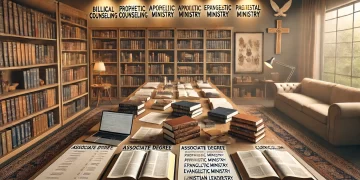Views: 2
Title: HIS 801: Early Church History and Patristic Studies
Subtitle: The Development and Influence of Early Christian Thought
Course Name & Level: Early Church History and Patristic Studies, Doctorate Degree
Number of Credit Hours: 3 credit hours
Keywords: Early Church, Patristic Studies, Church History
1. Introduction:
This course explores the history of the early Christian church, focusing on key events, figures, and theological developments. Special attention is given to the writings and contributions of the Church Fathers.
2. Course Description:
An advanced study of the history of the early church and patristic thought, examining the theological, social, and political contexts that shaped early Christianity. The course includes an analysis of primary texts and their relevance to contemporary theology.
3. Course Purpose:
To provide an in-depth understanding of the development and influence of early Christian thought through the study of church history and patristic writings.
4. Course Objectives:
To critically examine the historical and theological developments in the early church and evaluate their impact on contemporary Christian thought.
5. Key Terms Defined & Key Concepts Explained:
- Early Church: The period of Christian history from the first to the seventh century.
- Patristic Studies: The study of the writings and contributions of the Church Fathers.
- Church Fathers: Influential theologians and leaders of the early Christian church, including figures such as Augustine, Athanasius, and John Chrysostom.
- Ecumenical Councils: Assemblies of church leaders that convened to discuss and settle matters of church doctrine and practice.
- Heresy: Beliefs or practices that were deemed unorthodox or contrary to the established teachings of the church.
- Orthodoxy: Adherence to the accepted or traditional beliefs of the church.
- Apologetics: The defense and explanation of Christian beliefs against criticisms and misunderstandings.
6. Specific Topics with Descriptions:
- Introduction to Early Church History: Overview of the course and its objectives.
- The Apostolic Fathers: Study of the earliest Christian writings and their significance.
- Persecution and Martyrdom: Examination of the experiences of early Christians under Roman rule.
- Development of Christian Doctrine: Analysis of key theological developments and controversies.
- The Ecumenical Councils: Exploration of the major councils and their impact on church doctrine.
- Key Figures in Patristic Thought: Study of significant Church Fathers and their contributions.
- The Role of Monasticism: Examination of the rise and influence of monastic movements.
- The Formation of the Biblical Canon: Analysis of the process and criteria for the formation of the New Testament canon.
- Christianity and the Roman Empire: Exploration of the relationship between the church and the state.
- Heresy and Orthodoxy: Examination of major heresies and the church’s response.
- Patristic Exegesis and Hermeneutics: Study of the interpretive methods used by the Church Fathers.
- The Legacy of Patristic Thought: Discussion of the ongoing influence of early church theology on contemporary Christianity.
- Research Methodologies for Historical Theology: Examination of research methods applicable to the study of early church history and patristic thought.
7. Assessments with Descriptions:
- Quizzes: Regular quizzes to test knowledge of key concepts and historical events.
- Reflection Papers: Written reflections on personal insights and learnings from specific topics.
- Research Proposal: Development of a research proposal on a chosen topic related to early church history and patristic studies.
- Literature Review: Comprehensive review of existing literature related to the research topic.
- Research Paper: An in-depth research paper on an advanced topic in early church history and patristic studies.
- Midterm Exam: An exam covering the first half of the course material.
- Final Exam: Comprehensive exam covering the entire course.
- Participation: Active participation in seminar discussions and group activities.
- Presentation: A presentation on a significant aspect of early church history or patristic thought.
8. Research References:
- The Early Church by Henry Chadwick. eBook format. MLA Citation: Chadwick, Henry. The Early Church. Penguin Books, 1967.
- The Apostolic Fathers: An Introduction by Wilhelm Pratscher. eBook format. MLA Citation: Pratscher, Wilhelm. The Apostolic Fathers: An Introduction. Baylor University Press, 2010.
- Patristics: The Early Church Fathers by Andrew Louth. eBook format. MLA Citation: Louth, Andrew. Patristics: The Early Church Fathers. SPCK Publishing, 1990.
- The History of Christian Thought by Jonathan Hill. eBook format. MLA Citation: Hill, Jonathan. The History of Christian Thought. Lion Hudson, 2003.
- The Oxford Handbook of Early Christian Studies edited by Susan Ashbrook Harvey and David G. Hunter. eBook format. MLA Citation: Harvey, Susan Ashbrook, and David G. Hunter, editors. The Oxford Handbook of Early Christian Studies. Oxford University Press, 2008.
This comprehensive curriculum ensures that students engage deeply with early church history and patristic studies, focusing on King Jesus, His Kingdom, and His Great Commission.










